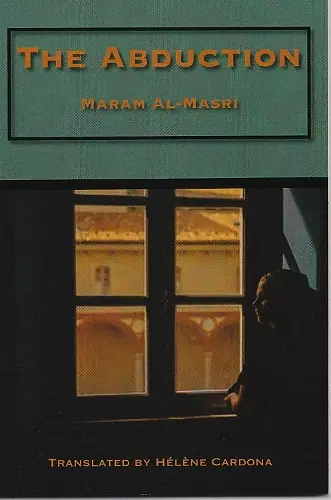The Abduction
Maram Al-Masri author Helene Cardona translator
Format:Paperback
Publisher:White Pine Press
Published:18th May '23
Currently unavailable, our supplier has not provided us a restock date

Ads in Rain Taxi & other journals Outside publicist Review copies to print and online media
Winner of an Albertine and FACE Foundation grant.
The Abduction details the terror and sorrow surrounding the abduction of Maram Al-Masri's only child by her then husband who fled to Syria, where due to the patriarchal nature of society and the social/political problems she was unable to fight for custody.The Abduction refers to an autobiographical event in Maram Al-Masri's life. When, as a young Arab woman living in France, she decides to separate from her husband with whom she has a child, the father kidnaps the baby and returns to Syria. Al-Masri won't see her son for thirteen years. This is the story of a woman denied the basic right to raise her child.
These are haunting, spellbinding poems of love, despair, and hope, a delicate, profound and powerful book on intimacy, a mother's rights, war, exile, and freedom. Maram Al-Masri embodies the voice of all parents, who one day, for whatever the reason, have been forcibly separated from their loved ones. She writes about the status of women, seeking to reconcile her role as a mother with her writing work. The terrible war that has devastated her native country since 2011 has painfully affected her.
Also included in The Abduction is The Bread of Letters, comprised of two poems addressing the act of writing: "Isn't the act of writing / an outrageous act in itself? Writing / is getting to know / one's innermost thoughts. / Yes, I am scandalous / because I show my truth and my nakedness of woman. / Yes I am scandalous / because I scream my pain and my hope, / my desire, my hunger and my thirst." For Al-Masri, writing is a vital and deeply human need: "When I write what I feel, I'm afraid of nothing. Poetry is my freedom and touches me where it lands most deeply. It offers me life vibration, the flush of a river, where feet and dreams meet." The Guardian described her as "a love poet whose verse spares no truth of love's joys and mercilessness."
With a tender eloquence that equals the French original, Hélène Cardona brings into English a harrowing tale, The Abduction by Maram Al-Masri, of a new mother devastated by the abduction of her son, kidnapped by his father to be raised in Syria. Now, as the distraught mother powerfully notes, "war rages within me." Cardona vividly conveys both palpable love and the wisdom learned from tragic loss: "To love, it is to prepare yourself / to be abandoned." As The Abduction proves, Hélène Cardona is a translator who has the exquisite sensitivity and erudition that this brave, vulnerable work deserves.
—Cynthia Hogue, winner of the Harold Morton Landon Translation Award from the Academy of American Poets, author of In June the Labyrinth
Using artfully spare language and repetition, Maram Al-Masri takes us deep into the emotional complexities of losing her young child to a patriarchal society. Hélène Cardona's deft translations capture both the stark immediacy and haunting music of these moving poems, almost letting us believe they were written in English.
—Martha Collins, author of Casualty Reports Because What Else Could I Do, winner of the Poetry Society of America's William Carlos Williams Award
In maternal bulletins, succinct, austere, and tender, the soul-ravaged speaker of The Abduction, like a Syrian Persephone, speaks from the wintry aftermath of her infant son's kidnapping ("dusk no longer has your eyes")—a shocking turn in a contentious divorce battle. The earliest poems in this remarkable sequence convey the female speaker's first euphoric observations of her child and arc to the windfall of her poignant reunion with her son thirteen years later. In the face of this domestic catastrophe, of patriarchal cruelty and callousness, Al-Masri takes a terse, almost elemental approach, employing silence and pareddown lyricism as able tools, reminding us of the poet's champion task ("to write / is to be the boat that saves the drowning") of seeking trusty, precise language for unbearable grief and waiting.
—Cyrus Cassells, 2021 Texas Poet Laureate and author of The World That the Shooter Left Us
Each small stanza of The Abduction picks at the torn seam between parent and child. As the narrator peers "out a window/ I haven't cleaned for a long time," we also see what has been snatched away. Arabic poet Al-Masri writes of the changed shape of her future, a devastation eloquently translated by Hélène Cardona.
—Lauren Camp, 2022 to 2025 New Mexico Poet Laureate and author of Took House
Maram Al-Masri's Le Rapt, as translated by Hélène Cardona, opens with the simple delights of a mother engaging with her young child, speaking to him as if he is a confidant. "He is occupied / making his ten fingers move / to convince me that love is the natural fruit / of the tree of life," she writes, and what could be more wonderful than that? Bliss, however, is followed by unbearable grief, when her child is abducted and separated from her for years by her then husband. The poems become the vessel for her dialogue with her missing child, and with her sorrow. Even when mother and child experience a complex reunion years later, each has learned to fear loving the other, and her son must face a second infancy, this time as an immigrant, much less blissful than the first. As a reader of poetry, I am compelled by the raw spareness of these poems, their keen honesty, and their refusal to provide us with a restoration arc. As a parent, I feel empathy, and awe at Al-Masri's survival. —Diane Seuss, author of frank: sonnets, winner of the Pulitzer Prize for Poetry and the National Book Critics Circle Award for Poetry
ISBN: 9781945680618
Dimensions: unknown
Weight: unknown
100 pages